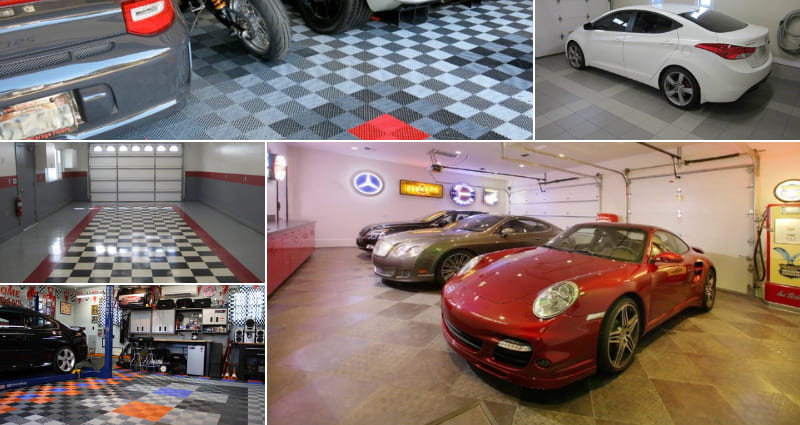
Never before have there been so many options available for garage floor tiles. Arguably the fastest-growing segment in garage flooring today, there are many styles and materials to choose from. As a result, we’ve put together this quick garage tile guide to make your selection easier.
Your options include interlocking tiles made of hard polypropylene plastic or rubber-like PVC. Then there are VCT tiles, porcelain or ceramic tiles, and even peel-and-stick polyvinyl garage floor tiles.
Some of these options can be an easy DIY installation while others may require some skill and experience. In addition, the durability and stain resistance of garage tiles can vary as well as the maintenance requirements to keep them clean and looking good.
However, they all have one thing in common. And that is the ability to custom design your garage floor with a variety of colors, patterns, and floor textures.
With that in mind, let’s look at the different garage floor tile selections available. We will discuss their features, benefits, and approximate costs. Hopefully, this will give you some good garage tile ideas and help you decide which is best based on your requirements and budget.
This post may contain affiliate links. If you use these links to make a purchase, we may earn a small commission. As an Amazon Associate, All Garage Floors earns from qualifying purchases. You can read our full disclaimer here.
Interlocking Floor Tiles
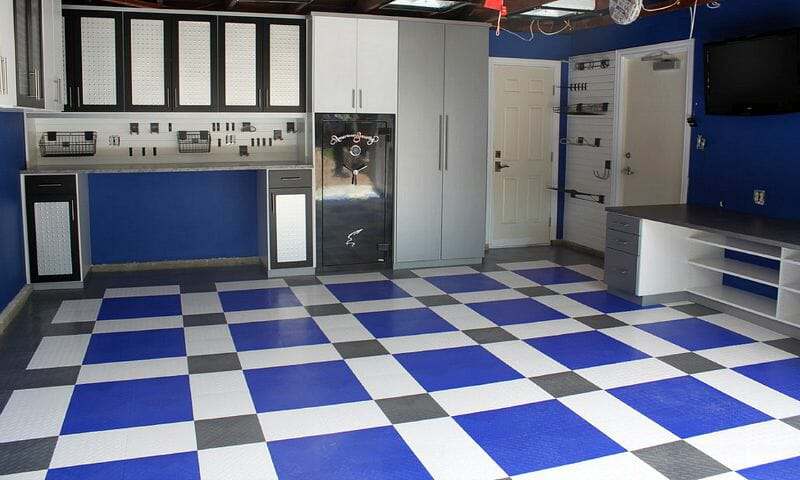
First on our list is interlocking garage floor tiles. Their fantastic looks, countless design options, and quick and easy installation have made them extremely popular. They are the primary reason for the fast growth in this segment of the market.
You can choose a solid color, multiple colors, or different tile sizes from 12”x12” to 24”x24” Plus, you can design racing-style checkered floor themes, create colored borders for car parking and storage areas, or even design walking paths between vehicles if you like.
Interlocking tiles are constructed of two distinctly different types of materials.
The first and most popular is polypropylene plastic. These thick and rigid plastic tiles snap together via a peg and loop connection. You can choose up to 18 different colors depending on the manufacturer.
Along with the multiple color choices, you also have two different tile tops to choose from. There are solid top tiles with various raised diamond designs, raised coin, and even carpets.
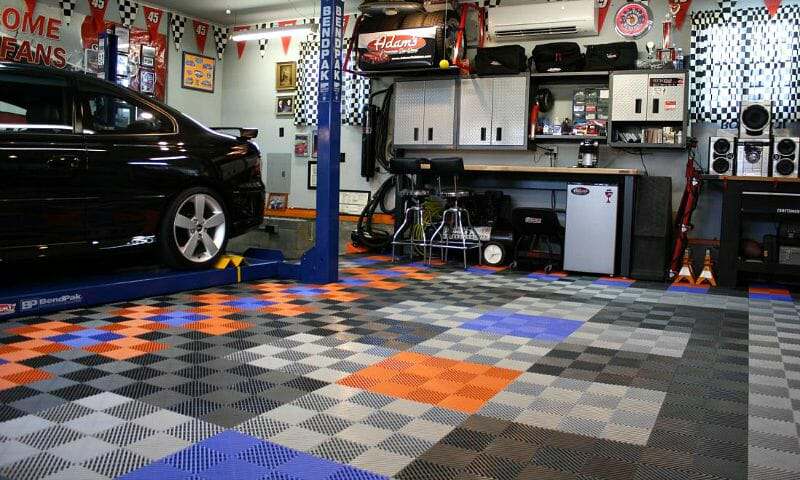
You can also select a vented or flow-through ribbed top. This design allows water, snow, and other debris to pass through the tile and keep it clean looking. Furthermore, it has a two-tone effect that many people like. This is due to the way light reflects off the ribbed structure on the surface.
The second choice of material for interlocking tiles is PVC or polyvinyl chloride. These tiles are thinner with a solid construction and a solid top. They have a flexible, rubber-like texture to them. Each tile connects via a puzzle lock system. The connective joints for PVC tiles are tight and prevent little if any water from migrating to the concrete below.
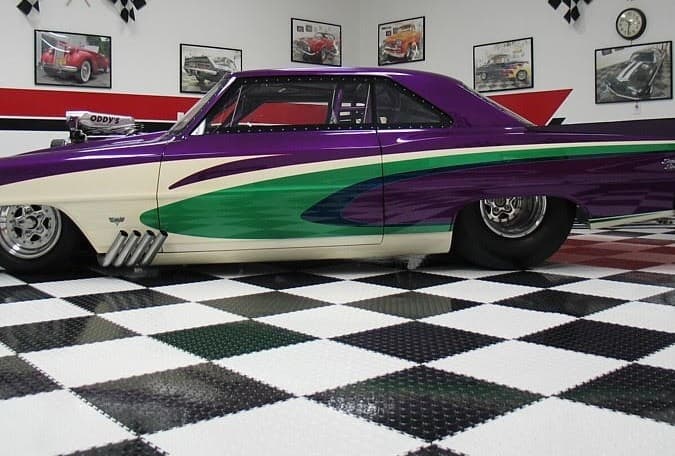
The numerous benefits of interlocking garage floor tiles are fairly impressive. Depending on which material you choose, they can be highly resistant to stains, chemicals, oils, and road salts. Plus, they will insulate from the cold concrete and create an anti-fatigue surface.
Furthermore, most provide a non-slip surface and are U.V. resistant so they won’t color fade in sunlight. Lastly, they are mold and mildew-resistant.
The best part of interlocking tiles is how easy and even fun they are to install. The tiles are “free-floating”, meaning that they are not affixed to the floor. They just snap into place. You can do an average garage in just a few hours.
This a great example of how easily interlocking tiles assemble
We suggest clicking on our article below for more detailed information. It will answer many of the questions that you may have. Plus, we include vendors that we recommend purchasing them from.
READ – What You Should Know About Interlocking Garage Floor Tiles
The cost for interlocking garage floor tiles varies greatly and largely depends on the type of tile material you choose. The starting price for the hard plastic polypropylene tiles is approximately $2.50 per square foot and can range as high as $5.
This is one of our Top Recommended vendors to purchase interlocking garage tiles
The cost of the rubber-like PVC interlocking tiles begins at just under $3 per square foot. However, the price can rise well over $8 per square foot depending on the tile thickness.
Vinyl Composite Garage Floor Tile
Vinyl composite tile, otherwise known as VCT, is another option that can provide the classy “retro” look to a garage floor that many people like. The traditional black and white checkered theme is easily the most popular.
Made of colored vinyl chips and limestone pressed together, they are available in a large variety of color choices. Each tile is 12”x12” in size, approximately 1/8” thick, and glued into place. These are the same commercial-quality tiles commonly seen in grocery stores, school hallways, and high-traffic businesses.
Once waxed and buffed to a glossy finish, VCT garage floors are fairly resistant to stains, automotive fluids, and road salts. They do tend to get a little slippery when wet. However, there are slip-resistant acrylic waxes that can be used.
Installation of a VCT tiled garage floor does require some basic DIY skills. It’s not a difficult job, but it will take the average person two or three days to complete. Besides gluing the tiles down, it also involves cleaning the concrete and filling any contraction joints, large cracks, or pitted surfaces first.
We suggest clicking on our article below to learn more about the installation of VCT tiles in a garage. We discuss installation, maintenance, and other topics about VCT that you may have questions about.
READ – Why VCT Tile is a Good Budget Garage Floor Option
In terms of cost, VCT can be a great low-cost garage floor tile choice. Tiles can sometimes be found for just under $1 each if you shop around for sales. This does not include the required adhesive and waxing supplies.
Peel and Stick Vinyl Garage Tile
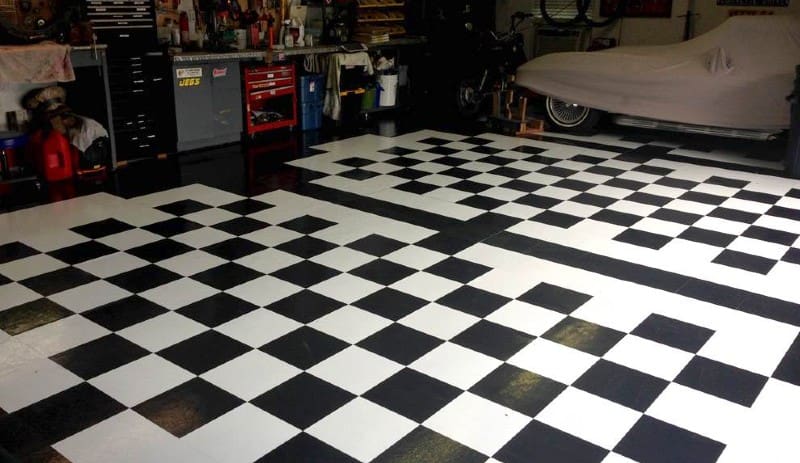
Another option that is a close cousin to VCT in terms of looks is peel-and-stick garage floor tiles. Also known as self-stick tiles, they are constructed of PVC and have a semi-gloss, non-porous finish.
What makes peel-and-stick tiles unique is the pressure-sensitive adhesive on the back. This means that there is no glue required to put down on the concrete first before installation. Just peel off the paper on the back of the tile and press it into place on the concrete.
Unlike VCT, polyvinyl peel-and-stick tiles do not require waxing or special topcoats applied to the surface. As a result, they offer better protection against chemicals and solvents.
You typically have the option of a raised diamond tread or levant (smooth but textured) design. In addition, most standard tile size choices are 12” x 12” or 24”x24”. There used to be a variety of colors to choose from. However, most manufacturers have now limited their colors to black, white, and gray.
You can click on our article below to learn more about peel-and-stick tiles. We also include some vendors we recommend purchasing them from.
READ – What you Should Know About Peel-and-Stick Garage Floor Tiles
The cost of self-stick garage tiles can begin around $1 per square foot and get as high as $5 per square foot. The reason for the large disparity has to do with the tile thickness and construction.
The more expensive peel-and-stick tiles such as RaceDay are thicker and constructed of solid PVC throughout. Lesser expensive tiles may use fillers and not be as thick.
Porcelain Garage Floor Tile
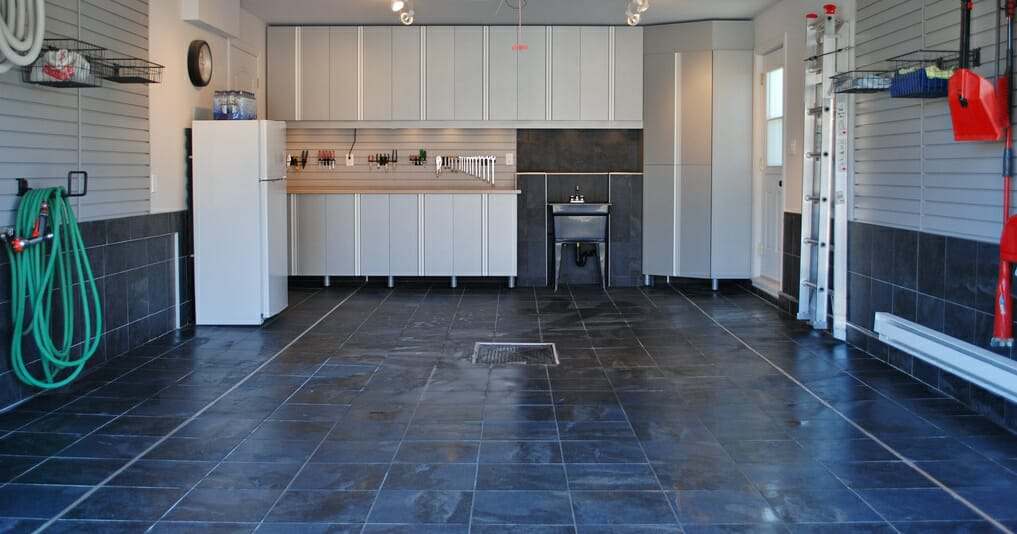
Last on our list of options is porcelain tile. Surprising to most people, it is one of the most durable garage flooring options that can be installed. It has been used for years in professional automotive garages, vehicle showrooms, and hotel porticos where cars park or pass through.
Porcelain is extremely dense and has a compressive strength of over 20,000 lbs. per square inch. The high-density results in a moisture absorbent rate of less than 0.5%. This essentially makes it impervious to water absorption and extremely difficult to stain. This includes road salts, oils, and other automotive fluids.
When installed properly, porcelain tile garage flooring is very difficult to scratch, break, or chip. It’s also one of the easiest tile options to keep clean.
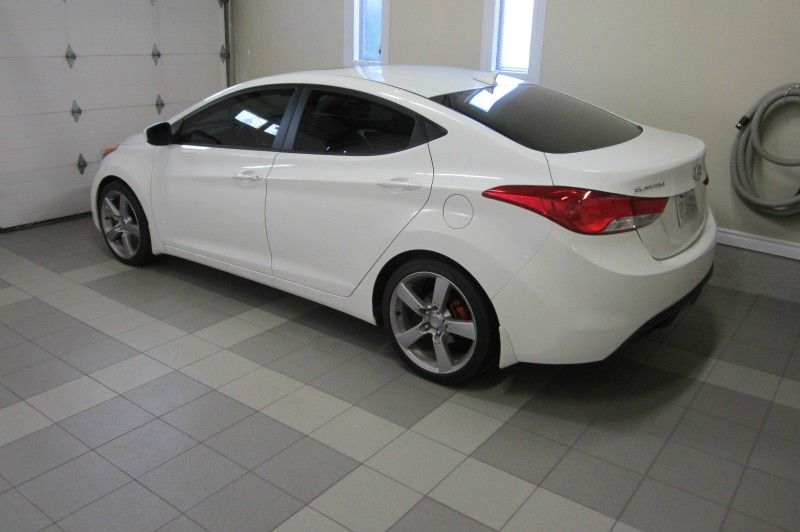
With good slip-resistance ratings available, porcelain does well in cold and wet climates where garage floors routinely see temperatures below freezing.
We suggest clicking on the link below to learn more. It answers many questions including what ratings you need when porcelain is used for a garage floor.
READ – Add a Touch of Class with a Porcelain Tiled Garage Floor
The cost of porcelain tile can quickly get expensive if you don’t shop around. DIY installation is difficult as well unless you have experience. As a result, installation can be another high cost if you need to hire someone to do it for you.
However, sales can sometimes be found for approximately $1 per square foot with the appropriate ratings for your garage floor. If you have some experience laying tile, then you will find that installation costs will be low as well.
Tips and Final Thoughts
Though the choices for garage floor tiles are many, there is no denying the fact that any one of them will completely transform the appearance of your garage. We recommend that you first establish how much your budget allows. Then determine which requirements are most important to you after that.
For ease of installation, nothing comes close to interlocking tiles. In terms of durability and stain resistance, porcelain tile is best. We would rank interlocking tiles as a close second.
If budget and low cost are a high priority, then VCT tiles or self-stick tiles can be the cheapest options if you shop around. Just keep in mind that installation will require some modest DIY skills.
No matter which garage flooring tile you choose, it can add character, flair, class, and even attitude depending on your design. Plus, you will have a garage floor that all your neighbors and friends will envy.

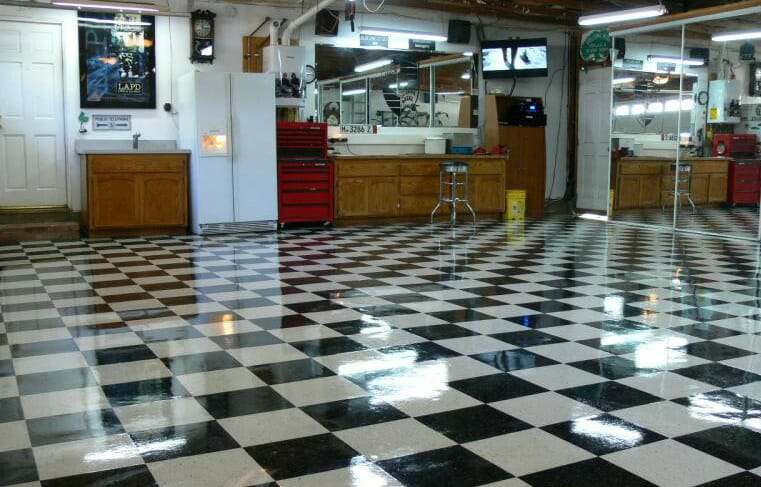
Where can I get peel and stick vinyl tiles, please tell, it’s urgent.
You can purchase them here, Pawan.
Can l see all fixing view of peel and stick vinayal tiles
Hi R A. You can view more of the peel and stick tiles here.
A few questions
1. What PEI rating is recommended for garage tiles?
2. How thick for Thinset?
3. Can you add anything to grout to stop staining?
Hi Triet. I suggest you read this article here about porcelain tile for a garage floor. You need PEI 4 or 5 rated tiles. The thinset should be applied with a 1/2″ x 1/2″ notched trowel. Make sure to back butter the tiles as well. There should be no air gaps under the tile or at the edges. Use an epoxy type of grout. It will not stain.
I appreciate all your help!
I would like a price quote on the tiles please for garages
Hello Joyce. Just to avoid confusion, All Garage Floors is an informational website only. We do not sell or install garage flooring products. If you would like to tell us what type of tile you are interested in, we would be happy to point you to vendors that we can recommend.
Hi Shea – do you have any experience with NewAge Stone Composite Luxury Vinyl Tile?
Hi Gene. As a matter of fact, we have a sample kit that we are currently doing some limited testing with ourselves. We will be putting out an article about this new product within the next 30 days. The tiles look very promising from what we have learned so far. However, NewAge customer service has not impressed us at all. We’ve sent two emails requesting information and so far we have not received a response. Apparently, we are not the only ones having this issue.
Thank you! Look forward to your article.
And FWIW, I had great customer service so far both via email (design and pricing) and when I called.
That’s encouraging to hear, Gene.
Do you have any recommendations on the flow through style or pvc style tiles for brands or places to shop? Hoping to find a good black friday deal.
Hi Joshua. RaceDeck is one of the top two premier brands. They usually have an 8 hour Black Friday sale with great deals. I would recommend contacting them to confirm if you are interested. Another great place to shop interlocking tiles is Garage Flooring LLC. Their TrueLock HD Ribbed tiles are excellent quality. We did a Reader’s Projects article about them.
Does rubber flooring insulate from cold well?
Our laundry room is in the garage and the floor is very cold.
Is there a type of flooring that works well to allow us walk and stand a little more comfortably?
Hi Silas. No, rubber does not insulate from the cold very well. It will take on the same temperature as the concrete. The rigid polypropylene interlocking tiles is one of the only options that will provide some insulations from the concrete. The underside structure is somewhat hollow and provides an air gap between the concrete and tile surface. The surface of the tile will tend to hover closer to the room air temperature than the floor temperature.
Excellent post, Shea. I have a suspended concrete garage floor with a few cracks that leak rain/snow runoff from vehicles to the room below. Parking garage coatings have been suggested to solve the problem, but they are crazy expensive. I’ve considered rollout mats, but am concerned that wheel turns will cause them to wrinkle and tear the seam. That leaves the vinyl tiles that purport to have waterproof seams, like Tuff-Seal and Armorpoxy Supratile. My thought is to seal with cracks with a good caulk, cover the floor with a waterproof membrane, like RedGard, then lay the tiles on that. I considered covering the floor with 6 mil plastic under the tiles, but thought that might make the tiles prone to slide. What do you think? have your seen RedGard other other waterproof membrane under interlocking tiles? Are the vinyl tile seams of the noted brands really watertight over time?
Hi Michael. The PVC garage floor tiles with the water tight seems rarely if ever leak. We would recommend sealing all the cracks, contraction joints, and the expansion joints at the perimeter of the slab with a self-leveling polyurethane sealant. Sikaflex is an example. Do not use caulk as it will shrink over time. The perimeter expansion joints are important to seal correctly, particularly if the slab is sloped in a way that allows water to collect there. Once that is done, apply a quality densifer with siliconate sealer added. This here is an example. We do not recommend using RedGard. The slight movement of the tiles as they flex will wear it away. In addition, don’t use the plastic sheeting. It can interfere with the way the tiles breath underneath. Even if a little bit of water made it’s way past the tiles, it will be allowed to evaporate.
Thank you, Shea. I was lazy with the word “caulk.” Sikaflex is what I intend to use. Would the densifier/silconate sealer be useful on a slab that is nearly 30 years old? I can certainly apply it. It’s not clear if it would provide backup protection for existing cracks, though.
Good thought on RedGard wearing with slight tile movement. My thinking is to provide 3 layered water mitigation solutions specifically for the cracks. Sikaflex sealant is one, and the watertight tiles is another, forming the top layer. RedGard was my first thought for a middle layer. Sani-Tred or Liquid Rubber applied as a wide swath over the cracks are other ideas. It sounds like you don’t think this belt-and-suspenders approach is necessary.
The age of the concrete does not matter, Michael. As long as it’s not dusting badly due to a soft surface, the densifier with siliconate sealer added will work well at sealing the surface. It doesn’t make it completely water proof, but if any moisture gets under the tiles it’s not going to penetrate far past the sealer if it gets to sit long enough. Penetrating sealers such as these do not seal cracks. That is why you want to use Sikaflex or equivalent. As long as large amounts of water does not run and pool between the edges of the tile and stem wall, you should be fine with this approach.
I was surprised to know porcelain tiles could works in a garage! These would gives an awesome look and functionality to my garage with a very reasonable cost compared to more high end and popular floor finish (Epoxy). I am just wondering how much abuse thoses can stand for week-end wrenching with the occasional tool drops and car jack and stand? It seams not to be a very popular choice so it is hard to find feedback on this. Beside that concern, in my opinion we should see more garage with this type of flooring!
Hi Julien. You need to read our article here that discuss just that topic.
Our garage floor is 100 years old with large cracks and crumbles. What could we fill with prior to porcelain or other tile material. Below freezing in winter but surprisingly no leaks or wet floor except what melts off of tires. We don’t want to jackhammer out and pour new concrete due to old foundation, brick walls. Want to be gentle.
Hi Sandra. Large cracks and crumbles does not sound good. We highly recommend that you first determine that the slab is sound before you do anything. If the cracks and crumbles run down to the ground in places, then all you will be doing is building up a floor surface on a poor foundation. This can lead to tiles cracking and a host of other issues. It’s going to require that you remove and chip away at all the loose materials until all that is remaining is solid concrete. Providing the remaining slab is sound, you will need to determine which polymer-modified concrete repair material you will need to use to fill in the voids. You can’t use regular cement. It does not adhere well and will eventually break loose. Ardex Americas is good product to source. It will require calling customer service and describing in detail the condition of the floor after you remove the all the loose materials. CTS products is another.
Hello,
Interested in porcelain tiles with PEI rating 4 or 5. Any recommendations/leads?
Thanks,
Tang
Hi Tang. Your best bet it to check the sales at your local home improvement centers. We hear many reports from our readers finding PEI 4 and 5 porcelain tiles for around $1 per square foot, sometimes a little less.